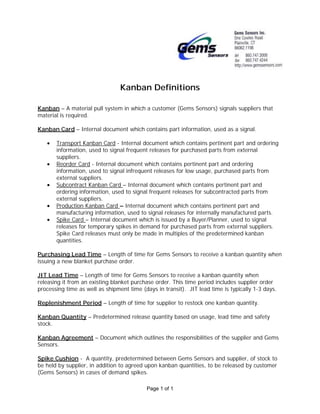
definitions
- 1. Kanban Definitions Kanban – A material pull system in which a customer (Gems Sensors) signals suppliers that material is required. Kanban Card – Internal document which contains part information, used as a signal. • Transport Kanban Card - Internal document which contains pertinent part and ordering information, used to signal frequent releases for purchased parts from external suppliers. • Reorder Card - Internal document which contains pertinent part and ordering information, used to signal infrequent releases for low usage, purchased parts from external suppliers. • Subcontract Kanban Card – Internal document which contains pertinent part and ordering information, used to signal frequent releases for subcontracted parts from external suppliers. • Production Kanban Card – Internal document which contains pertinent part and manufacturing information, used to signal releases for internally manufactured parts. • Spike Card – Internal document which is issued by a Buyer/Planner, used to signal releases for temporary spikes in demand for purchased parts from external suppliers. Spike Card releases must only be made in multiples of the predetermined kanban quantities. Purchasing Lead Time – Length of time for Gems Sensors to receive a kanban quantity when issuing a new blanket purchase order. JIT Lead Time – Length of time for Gems Sensors to receive a kanban quantity when releasing it from an existing blanket purchase order. This time period includes supplier order processing time as well as shipment time (days in transit). JIT lead time is typically 1-3 days. Replenishment Period – Length of time for supplier to restock one kanban quantity. Kanban Quantity – Predetermined release quantity based on usage, lead time and safety stock. Kanban Agreement – Document which outlines the responsibilities of the supplier and Gems Sensors. Spike Cushion - A quantity, predetermined between Gems Sensors and supplier, of stock to be held by supplier, in addition to agreed upon kanban quantities, to be released by customer (Gems Sensors) in cases of demand spikes. Page 1 of 1
- 2. Page 1 of 1
